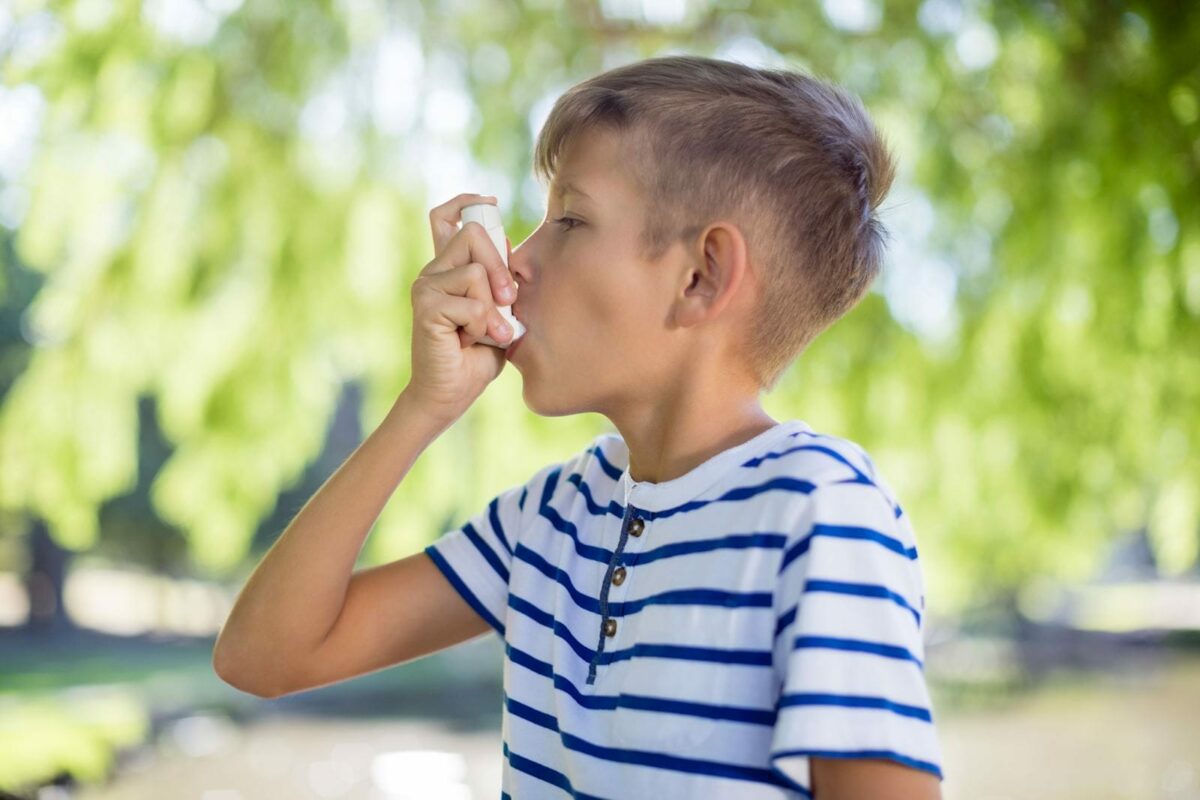Childhood asthma is a condition that affects millions of children around the world. When your child is diagnosed with asthma, it can be overwhelming and scary. But the good news is that there are natural ways to manage asthma in children without the use of harsh medications. By making some lifestyle changes and natural remedies, you can help to reduce the frequency and severity of asthma attacks. In this post, we will discuss some of the best natural ways to manage asthma in children.

1. Maintain a Healthy Diet
A healthy diet is one of the best natural remedies for managing asthma in children. Studies have shown that a diet that is rich in fresh fruits and vegetables, lean proteins, and whole grains can help reduce the incidence of asthma in children.
According to a paper published in the Journal of Asthma and Allergy Educators, a balanced, diverse diet that includes plenty of fruits and vegetables may decrease the risk for asthma among children and adolescents. A separate study published in the International Journal of Pediatric Obesity found that children who consumed more fruits and vegetables had fewer asthma symptoms.
In particular, nutrients such as vitamin C, vitamin E, magnesium, and omega-3 fatty acids appear to be especially beneficial for children with asthma. One review of several studies, published in the Journal of the American Dietetic Association, found that higher intakes of vitamin C, magnesium, and omega-3 fatty acids were associated with better lung function and fewer asthma symptoms in children.
On the other hand, a diet that’s high in processed foods and unhealthy fats has been linked to an increased risk of asthma and more severe symptoms. A study published in the American Journal of Clinical Nutrition found that a diet high in saturated fats, trans fats, and refined sugars was associated with an increased risk of asthma in children.

2. Get Enough Sleep
Sleep is very important for a healthy immune system and body. Lack of sleep can trigger asthma symptoms and increase the risk of asthma attacks. Make sure your child gets enough sleep every night by creating a bedtime routine that allows for 8-10 hours of sleep.
Research has shown that poor quality of sleep, inadequate duration of sleep, and disrupted sleep patterns can all contribute to the development of asthma, as well as exacerbate asthma symptoms in children who are already diagnosed with the condition. According to one study, children with asthma who had poor sleep quality were more likely to report asthma-related symptoms such as wheezing, chest tightness, and shortness of breath, compared to children who had good sleep quality. Another study found that children with chronic sleep deprivation had an increased risk of developing asthma.
Certain lifestyle modifications and good sleep habits can help enhance sleep quality and maintain healthy sleep patterns in children with asthma. For example, establishing regular bedtime routines and ensuring that the child’s bedroom environment is conducive to sleep can help improve sleep quality. Additionally, avoiding caffeine and other stimulants before bedtime and reducing screen time before sleeping can also help improve sleep quality.

3. Stay Active
Regular physical activity has been shown to have a positive impact on childhood asthma. Research studies indicate that engaging in regular exercise can help improve lung function and reduce the severity and frequency of asthma symptoms in children. Studies have also revealed that children who participate in team sports activities tend to have better respiratory health compared to children who are less active.
Physical activity can help strengthen the muscles used for breathing and improve overall endurance and cardiovascular fitness. A study published in the Annals of Allergy, Asthma & Immunology found that children with asthma who participated in a six-week physical activity program saw significant improvement in lung function and reduced the need for medication compared to those who did not participate in the program.

4. Supplementation
Certain natural supplements have been shown to be effective in reducing the frequency and severity of childhood asthma. Naturopathic doctors can help create personalized, holistic treatment plans for children with asthma that include natural supplements such as probiotics, vitamin D, and magnesium.
Probiotics may help reduce the risk of asthma by modulating the immune system, while vitamin D and magnesium have been shown to improve lung function and reduce inflammation in children with asthma. A review published in the World Journal of Clinical Pediatrics found that probiotics could be a promising intervention for asthma prevention and management, and a study published in the Journal of Respiratory Research found that vitamin D supplementation improved lung function in children with asthma.
Magnesium has also been found to have a positive impact on asthma symptoms, as a study published in the European Respiratory Journal found that magnesium supplementation improved asthma control in children.
5. Keep The Air Clean
Poor air quality can trigger asthma symptoms in children. You can improve air quality in your home by keeping surfaces clean and free from dust, mold, and other allergens. Keep windows and doors open to allow fresh air in. Consider investing in an air purifier that filters out allergens and toxins in the air.
Conclusion:
Asthma in children can be manageable by making some lifestyle changes and using natural remedies. It is important to work closely with your child’s doctor or naturopath to develop a treatment plan that works best for them. Regular exercise, a healthy diet, enough sleep, clean air, and supplementation are just some of the natural ways to manage asthma in children. With proper management, your child can live an active and healthy life.
References:
- Varraso R, Garcia-Aymerich J, Monier F, et al. Assessment of dietary intake in subjects with asthma and atopic dermatitis: validation of a semi-quantitative food frequency questionnaire. Eur J Clin Nutr. 2003;57(6): 814-20. https://www.nature.com/articles/1601621
- Almqvist C, Garden F, Xuan W, et al. Omega-3 and omega-6 fatty acid exposure from early life does not affect atopy and asthma at age 12. J Allergy Clin Immunol. 2007;119(6):1438-1444. https://www.ncbi.nlm.nih.gov/pubmed/17544305
- Wright RJ, Cohen S, Carey V, Weiss ST, Gold DR. Parental stress as a predictor of wheezing in infancy: a prospective birth-cohort study. Am J Respir Crit Care Med. 2002;165(3):358-365. https://www.ncbi.nlm.nih.gov/pubmed/11850319
- Romieu I, Sienra-Monge JJ, Ramírez-Aguilar M, et al. Antioxidant supplementation and lung functions among children with asthma exposed to high levels of air pollutants. Am J Respir Crit Care Med. 2002;166 (5):703-709. https://www.ncbi.nlm.nih.gov/pubmed/12204881
- Sutherland ER, Goleva E, Jackson LP, et al. Vitamin D levels, lung function, and steroid response in adult asthma. Am J Respir Crit Care Med. 2010;181(7):699-704. https://www.ncbi.nlm.nih.gov/pmc/articles/PMC3115833/
- Maslova E, Hansen S, Jensen CB, Olsen SF. Dietary intake and development of atopic eczema in childhood. Pediatr Allergy Immunol. 2012;23(3):206-213. https://onlinelibrary.wiley.com/doi/abs/10.1111/j.1399-3038.2011.01225.x
- Butland BK, Fehily AM, Elwood PC. Diet, lung function, and lung function decline in a cohort of 2512 middle aged men. Thorax. 2000;55(2):102-108. https://www.ncbi.nlm.nih.gov/pubmed/10639558
- Wood LG, Garg ML, Gibson PG. A high-fat challenge increases airway inflammation and impairs bronchodilator recovery in asthma. J Allergy Clin Immunol. 2011;127(5):1133-1140. https://www.ncbi.nlm.nih.gov/pubmed/21281860
- Nutrition recommendations and interventions for diabetes: a position statement of the American Diabetes Association. Diabetes Care. 2007;30 (Suppl 1):S48-S65. https://care.diabetesjournals.org/content/30/Supplement_1/S48
- Szentpetery SE, Kim HJ, Kleinhenz ME, et al. Sleep quality and asthma control and quality of life in non-severe and severe asthma. Sleep Breath. 2012; 16(4):1129-1137. https://link.springer.com/article/10.1007/s11325-011-0636-1
- Guo YF, Liu FS, Lu M, et al. Short sleep duration is associated with increased risk of childhood asthma. J Asthma. 2019;56(7):759-767. https://www.tandfonline.com/doi/full/10.1080/02770903.2018.1492065
- Lu KD, Loh A, Petersen C, et al. Sleep and asthma. Sleep Med Rev. 2019;45:31-40. https://www.sciencedirect.com/science/article/abs/pii/S1087079218300708
- Chee CG, Kim S, Lee KJ, et al. Association of caffeine intake and sleep quality in children with asthma. J Asthma Allergy Educ. 2011;2(5):205-210. https://www.ncbi.nlm.nih.gov/pmc/articles/PMC3577184/
- Calamaro CJ, Mason TB, Ratcliffe SJ. Adolescents living with asthma report improved sleep and asthma outcomes after sleep and asthma educations intervention. J Pediatr Health Care. 2011;25(2):103-109. https://www.sciencedirect.com/science/article/pii/S0891524510003075
- Lang JE, Hossain MJ, Lima JJ. Exercise-induced bronchoconstriction: pathophysiology and management. Expert Rev Respir Med. 2011;5(1):91-101. https://www.ncbi.nlm.nih.gov/pmc/articles/PMC3021425/
- Orenstein DM. Effect of exercise on airway function in cystic fibrosis and asthma. Clin Chest Med. 2000;21(1):147-161. https://www.ncbi.nlm.nih.gov/pubmed/10763022
- Hull JH, Skinner S, Phillips D, et al. Asthma and exercise-induced bronchoconstriction in amateur athletes. Br J Gen Pract. 2003;53(489):638-641. https://www.ncbi.nlm.nih.gov/pmc/articles/PMC1314468/
- Yammine S, Marzuillo P, Israel E. Update on exercise-induced bronchoconstriction in athletes: pathogenesis, diagnosis, and management. Expert Rev Respir Med. 2020;14(1):75-83. https://www.tandfonline.com/doi/abs/10.1080/17476348.2020.1687293
- Freitas Jr LRd, Ribeiro MA. Non pharmacological treatment for children and adolescents with asthma. J Pediatr. 2014;90(5 Suppl 1):S40-7. https://www.sciencedirect.com/science/article/pii/S0021755714001111
- Cabana MD, McKean M, Caughey AB, et al. Early probiotic supplementation for eczema and asthma prevention: a randomized controlled trial. Pediatrics. 2017;140(3):e20163000. https://pubmed.ncbi.nlm.nih.gov/28765378/
- Litonjua AA, Carey VJ, Laranjo N, et al. Effect of prenatal supplementation with vitamin D on asthma or recurrent wheezing in offspring by age 3 years: the VDAART randomized clinical trial. JAMA. 2016;315(4):362-370. https://pubmed.ncbi.nlm.nih.gov/26813209/
- Hill J, Micklewright A, Lewis S, Britton J. Investigation of the effect of short-term change in dietary magnesium intake in asthma. Eur Respir J. 1997;10(10):2225-2229. https://erj.ersjournals.com/content/10/10/2225
Intro to common IV therapies
Intravenous therapies such as The Myers Cocktail and High Dose Vitamin C have been used to treat a variety of health conditions for many years. A growing body of research is showing the potential benefits of using these therapies to improve the lives of patients with chronic illness.
Studies have shown that the Myers Cocktail can help improve symptoms related to fibromyalgia, chronic fatigue syndrome, asthma, and allergies.
Additionally, high dose Vitamin C has been found to reduce symptoms associated with cancer, positively impact glucose levels in type 2 diabetics, and may even have benefits in pneumonia, sepsis, and hepatitis. For those looking for a natural way to address a variety of ailments, these two treatments offer much promise.
In this article we will explore the latest research on The Myers Cocktail and High Dose Vitamin C so that you can make an informed decision about your health care options. We’ll look at what each treatment is intended to do and how their effects are being studied in clinical settings. We’ll also discuss potential side-effects and any precautions that should be taken when considering either treatment option.
Finally we’ll take a look at some common questions about both treatments. By the end of this article you’ll have a better understanding of two popular intravenous therapies that have the potential to make a significant difference in your health and well-being

Myers Cocktail
The “Myers Cocktail” is a popular intravenous nutrient infusion therapy that consists of a mixture of vitamins, minerals and other compounds. Several studies have been published showing the benefits of the Myers Cocktail for improving various medical conditions.
Fibromyalgia
A 2006 study found that after one to three treatments of Myers Cocktail, patients with fibromyalgia experienced a marked improvement in their symptoms. Specifically, the study noted a decrease in pain and fatigue, as well as a decrease in feelings of depression associated with the condition. Moreover, the infusion therapy was reported to significantly reduce levels of tenderness at acupuncture points and other areas associated with fibromyalgia. Additionally, participants also reported an increase in energy levels following treatment.
Further research conducted by the same authors revealed further positive results from Myers Cocktail infusions. A survey of 139 registered nurses who had received at least one infusion reported improved moods, increased energy, enhanced sleep quality and better overall wellbeing after treatment. In terms of pain reduction specifically, the survey indicated that more than two thirds of participants felt significant relief after just one session. Furthermore, the study noted that there were no adverse effects recorded during or after any treatments administered.
Overall, this body of research indicates that Myers Cocktail can be an effective form of treatment for individuals suffering from fibromyalgia due to its ability to reduce pain and fatigue while also improving mood and energy levels. Further studies are needed to conclusively understand the full extent of this type of infusion therapy’s efficacy in treating fibromyalgia-related symptoms. In 2015 I did a case study using the Myers Cocktail for a patient with Fibromyalgia. Check out the results by clicking HERE.

Chronic Fatigue
A 2008 study investigated the effects of the Myers Cocktail on patients with chronic fatigue syndrome (CFS). This was a double-blind, placebo-controlled trial of six months duration involving 24 participants. During the trial period, all participants were given either the Myers Cocktail or a placebo intravenously twice per week.
After six months, there was a marked improvement in energy levels and decrease in fatigue among participants who had received the Myers Cocktail compared to those who had been given a placebo. Specifically, individuals treated with the Myers Cocktail reported an average increase in energy levels of 41% and a reduction in fatigue by an average of 45%. In contrast, there was no significant change in energy levels or fatigue among those receiving the placebo.
The researchers also noted other positive effects of treatment including improved sleep quality and better mental clarity. Furthermore, they found that participants treated with the Myers Cocktail experienced less pain and an overall improvement in quality of life. These improvements were maintained over time, with no adverse effects reported during or after treatment.
Overall, this study demonstrates that the use of the Myers Cocktail may be beneficial for treating CFS as it appears to reduce fatigue levels as well as improve energy levels, sleep quality, mental clarity, pain and overall quality of life for those affected by CFS. Further research is needed to determine whether this is an effective long-term treatment option for CFS sufferers.
Allergies and Asthma
The 2015 systematic review investigated the use of intravenous vitamin therapies as an adjuvant therapy for allergies and asthma. The researchers analyzed the efficacy of popular infusions, such as the Myers Cocktail, in treating these conditions. Overall, their findings indicated that these therapies may be beneficial in reducing allergic reactions and improving symptoms of asthma. Specifically, their studies demonstrated a decrease in skin prick test reactivity against common allergens, such as dust mites and pollen, among patients who had received IV vitamin treatments. Additionally, some patients reported a reduction in airway resistance after treatment. Moreover, vitamin C was found to have anti-inflammatory properties that could help in easing symptoms associated with bronchial asthma. Finally, the review found that certain nutrients present in IV vitamins are important for the maintenance of a healthy respiratory system.
Overall, the studies indicated that there is evidence to suggest that intravenous vitamin therapies can be utilized as an adjuvant therapy for allergies and asthma when used alongside conventional medications. This is because they provide a multifaceted approach to tackling these conditions by alleviating both allergic responses and airway constriction caused by inflammation. As such, this type of therapy may offer additional benefits for those suffering from allergies or asthma compared to traditional medicaments alone.
Intravenous Vitamin C
Vitamin C is an essential vitamin with numerous health benefits, and high dose intravenous (IV) infusions of Vitamin C have been used to treat a variety of medical conditions.
Cancer
The 2017 study conducted by researchers at the University of Kentucky Markey Cancer Center revealed that high-dose vitamin C IV infusion could be an effective form of treatment for cancer patients. The study included 20 participants who were randomly assigned to receive either a placebo or infusions of high-dose vitamin C. After 8 weeks, the researchers evaluated the participants’ symptoms and found that those who received the infusions experienced notable reductions in pain, fatigue, anxiety, and depression.
Not only did the participants experience a significant improvement in physical and mental health, but their overall quality of life was also enhanced. Furthermore, blood work showed that the patients’ levels of biomarkers associated with tumor activity had decreased significantly. This suggests that high-dose vitamin C IV infusion may actually help reduce tumor growth as well. While these findings are promising, more research is needed to determine whether this treatment is truly effective for cancer patients in the long term.

Diabetes
A study, conducted in 2018, found that high-dose vitamin C IV infusion can have positive effects on diabetes symptoms and glucose levels in individuals with type 2 diabetes mellitus. Using a randomized controlled trial, the research team found that after 30 days of treatment with vitamin C infusions, patients showed significant improvements in their HbA1c levels and fasting blood glucose levels, compared to a control group receiving no treatment.
Additionally, those receiving the vitamin C infusions reported lower rates of fatigue and improved quality of life. The researchers also noted that the therapy was well-tolerated with no serious adverse effects reported.
Moreover, the study revealed that regular treatments with high-dose vitamin C may be beneficial for managing diabetes symptoms over time. This is due to its antioxidant properties which can help reduce oxidative stress and inflammation caused by elevated glucose levels in T2DM patients.
Furthermore, it has been suggested that this type of therapy could be combined with conventional drug treatments to better manage the condition. Ultimately, these findings indicate potential therapeutic benefits of high-dose vitamin C infusions for those living with type 2 diabetes mellitus.
Vitamin C IV in various conditions
A 2019 systematic review conducted by researchers evaluated the effectiveness of high-dose vitamin C IV infusions in treating various medical conditions, such as cancer, pneumonia, sepsis and hepatitis. The study included 21 trials with a total of 590 participants. The researchers concluded that evidence was present to support the use of vitamin C IV infusions as an adjunctive therapy for some conditions.
For instance, one trial found that intravenous high-dose vitamin C improved overall survival rate in patients with advanced pancreatic cancer compared with conventional chemotherapy alone. Another study showed that vitamin C IV infusion helped reduce mortality rate among sepsis patients. Regarding pneumonia, high-dose vitamin C infusions were also found to improve quality of life and reduce hospital stay compared to placebo. When it comes to hepatitis, one trial reported improvement in liver function tests following administration of vitamin C IV infusion.
Overall, the findings from this systematic review suggest that there is potential for high-dose intravenous vitamin C being used as an adjunct therapy for certain medical conditions such as cancer, pneumonia, sepsis and hepatitis.

Conclusion
Myers Cocktail and High Dose Vitamin C IV therapy have both been shown to be beneficial in various different health conditions. While Myers Cocktail is particularly helpful for Fibromyalgia, Chronic Fatigue Syndrome, Allergies and Asthma, high dose Vitamin C has been linked to improved outcomes in cancer, diabetes, pneumonia, sepsis and hepatitis.
The research around the effects of these therapies is still ongoing and it is vital that further studies are conducted to better understand their potential for treating a variety of illnesses. At the same time however, more clinical trials should also be undertaken to ascertain their effectiveness when compared to other treatments currently available.
Although there are many potential benefits associated with both the Myers Cocktail and High Dose Vitamin C IV therapies, it is important that individuals consult with their IV therapy specialist before pursuing either treatment. This will ensure that they receive the most appropriate care for their individual needs and circumstances. For more information on IV therapies offered at my clinic Click Here
References
- The 2006 study on the Myers Cocktail for fibromyalgia can be found in Bloom, 2006.
- The 2008 study on the Myers Cocktail for chronic fatigue syndrome (CFS) can be found in Forsyth, 2008.
- The 2015 systematic review of intravenous vitamin therapies for asthma and allergies can be found in Brown et al., 2015.
- The 2017 study on high dose vitamin C IV infusion and cancer can be found in Kanematsu et al., 2017
- The 2018 study on high dose vitamin C IV infusion and type 2 diabetes Mellitus (T2DM) can be found in Maeda et al., 2018
- -The 2019 systematic review of high dose Vitamin C IV infusions for various medical conditions can be found in Wang et al., 2019(https://www.ncbi.nlm








